初三英语12单元知识点详解
人教版英语九年级Unit12 Section B 知识点讲解

After that, We had a P.E. class .Although I like P.E. very much,I was very hungry and couldn't do any exercise.
Finally, when I got back home after school, I was very tired and hungry,because I ate nothing all day.
A. given out B. looked out C. sold out D. come out
7.— How many people were invited to the meeting?
— About six ____. A. hundred B. hundreds C. hundred of D. hundreds of
• costume n.(特定场合穿的)服装;装束 • costume party化装舞会
• embarrass v. 使尴尬→embarrassed adj.窘 迫的; 尴尬的(用来修饰人)
人教版英语九年级第十二单元知识点

Unite 12 Life is full of unexpected1.leave sth+地点状语:把......留在某地2.ring sb. =give sb. a ring 给某人打电话3.Stare at/into 盯着看......4.above、over与on 的区别:above/在…上方不接触,不垂直over/在…正上方不接触,垂直ron/在…上面,有接触面5.finish doing sth 完成某事6.by the time 在......以前,引导时间状语从句。
on time准时,all the time一直,始终,经常,at the time 当时7.go off 发出声响go home 回家,go shopping 去购物,go out出去,go swimming 去游泳,go to work上班,go to school去上学8.wake up 睡醒,醒来9.Put on 穿上;戴上10.end up 结束;结果为11.turn into 变成turn on打开,turn off 关掉,turn up调大,turn down调小,turn in 上交,提交,turn over翻身;翻转12.Show up 赶到;露面Show ...around带领某人参观,show sb. Sth.=show sth. to sb.给某人看某物show off炫耀;卖弄on show 展览13.get a chance to do sth 得到机会做某事have a chance of doing sth. 有做某事的可能性;by the chance碰巧;miss the chance失去机会;take the chance把握机会14.be about to do sth. 即将做某事,不可与immediately, tomorrow等表示将来的副词连用。
15.be about to ...when...就在要做......的时候,突然......(又发生另一件事)16.Invite sb. to do sth.邀请某人做某事,invite sb. to +地点邀请某人去某地17.make a fool of...取笑......;捉弄......18.announce sth. to sb.=announce to sb. sth.向某人宣告某事19.get dressed 穿衣服20.all kinds of 各种各样的be kind to sb.对某人友好,kind of 有点;稍微,a kind of一种;某种21.stop doing sth.停止做某事stop to do sth.停下来去做某事22.sell out卖光23.hundreds of数百;成百上千的24.run away 逃跑run out of 用尽,run across偶然碰到,run after追赶25.as+形容词/副词原级+as sb. can/could 某人尽可能地...=as+形容词/副词原级+as possible。
人教版英语九年级全册单元unit 12 知识点+测试卷+思维导图
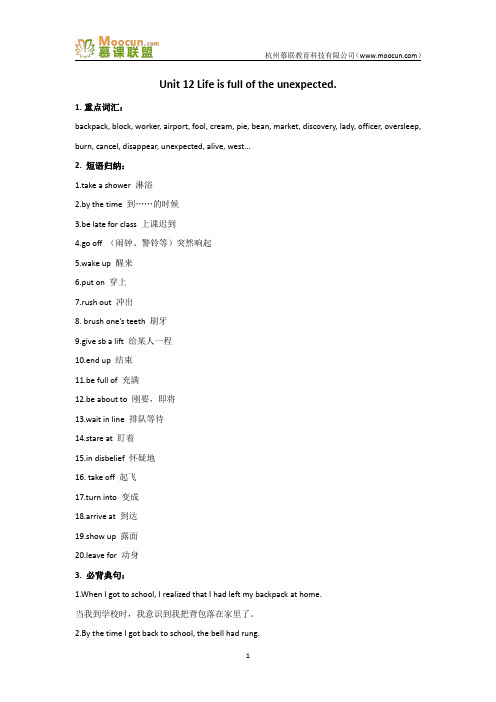
Unit 12 Life is full of the unexpected.1.重点词汇:backpack, block, worker, airport, fool, cream, pie, bean, market, discovery, lady, officer, oversleep, burn, cancel, disappear, unexpected, alive, west...2. 短语归纳:1.take a shower 淋浴2.by the time 到……的时候3.be late for class 上课迟到4.go off (闹钟、警铃等)突然响起5.wake up 醒来6.put on 穿上7.rush out 冲出8. brush one’s teeth 刷牙9.give sb a lift 给某人一程10.end up 结束11.be full of 充满12.be about to 刚要,即将13.wait in line 排队等待14.stare at 盯着15.in disbelief 怀疑地16. take off 起飞17.turn into 变成18.arrive at 到达19.show up 露面20.leave for 动身3. 必背典句:1.When I got to school, I realized that I had left my backpack at home.当我到学校时,我意识到我把背包落在家里了。
2.By the time I got back to school, the bell had rung.当我回到学校时,铃声已经响了。
3. Before I got to the bus stop, the bus had already left.在我到达公共汽车站之前,公共汽车已经开走了。
4. As I was waiting in the line with the other office workers, I heard a loud sound.当我和其他办公室工作人员在排队的时候,我听到了一个很大的声音。
人教版九年级下册英语12单元知识点总结
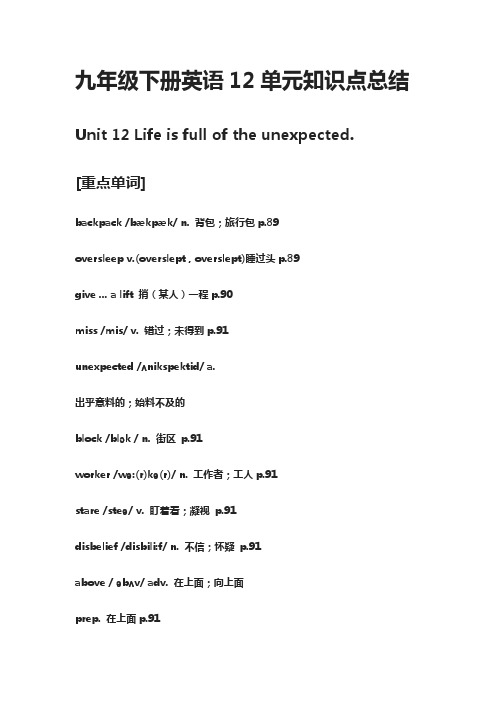
九年级下册英语12单元知识点总结Unit 12 Life is full of the unexpected.[重点单词]backpack /bækpæk/ n. 背包;旅行包p.89oversleep v.(overslept , overslept)睡过头p.89give ... a lift 捎(某人)一程p.90miss /mis/ v. 错过;未得到p.91unexpected /ʌnikspektid/ a.出乎意料的;始料不及的block /blɔk / n. 街区p.91worker /wə:(r)kə(r)/ n. 工作者;工人p.91stare /steə/ v. 盯着看;凝视p.91disbelief /disbili:f/ n. 不信;怀疑p.91above /əbʌv/ adv. 在上面;向上面prep. 在上面p.91burn /bə:(r)n/ v. (burnt /bə:(r)nt/, burned /;burnt, burned) 着火;燃烧p.91alive /əlaIv/adj. 活着;有生气的p.91take off(飞机等)起飞;匆忙离开p.91till /til/ conj. & prep. 到;直到p.91west /west/ adv. 向西;朝西adj. 向西的;西部的n.西;西方p.91 cream /kri:m/ n. 奶油;乳脂p.92boss/bɔs/ n. 老板;领导p.92pie /pai/ n. 果馅饼;果馅派p.92course /kɔ:(r)s/ n. 课程p.92bean /bi:n/ n. 豆;豆荚p.92market /ma:(r)kit/ n. 市场;集市p.92costume /kɔstju:m/ n.服装;装束p.93embarrassed /imbærəst/ adj.窘迫的;害羞的p.93announce /ənauns/ v. 宣布;宣告p.94spaghetti /spəgeti/ n. 意大利面条p.94hoax /həuks/ n. 骗局;恶作剧p.94discovery /diskʌvəri/ n. 发现;发觉p.94lady /leidi/ n. 女士;女子p.94officer /ɔfisə/ n.军官;官员p.94believable /bili:vəbl/ adj.可相信的;可信任的p.95 embarrassing /imbærəsiŋ/ a. 使人害羞的(难堪的或惭愧的)p.95 New Zealand /nju:zi:lənd/ 新西兰p.91Italy /Itəli/ 意大利p.94Mars /ma:(r)z/ 火星p.94Carl /ka:(r)l/ 卡尔(男名)p.90Orson /ɔ:(r)sən/ Welles /welz/ 奥森•韦尔斯p.94【重点短语】1. take a shower 淋浴2. leave my backpack at home 把背包忘在家里3. get back to school 返回学校4. start teaching 开始教学5. go off 响铃6. rush out the door 冲出房门7. give sb a lift 捎某人一程8. miss both events 错过两个事件9. be about to do sth 正要做某事10. stare in disbelief at 难以置信地盯着11. raise above the burning building 从正在燃烧的楼上升起12. jump out of bed 跳下床13. collect the math homework 收数学作业14. show up 赶到,出现【重点句型】1. By the time I got up, my brother had already gotten in the shower. 当我起床时,我哥哥已经进了浴室了。
人教版英语九年级Unit12单元知识点归纳
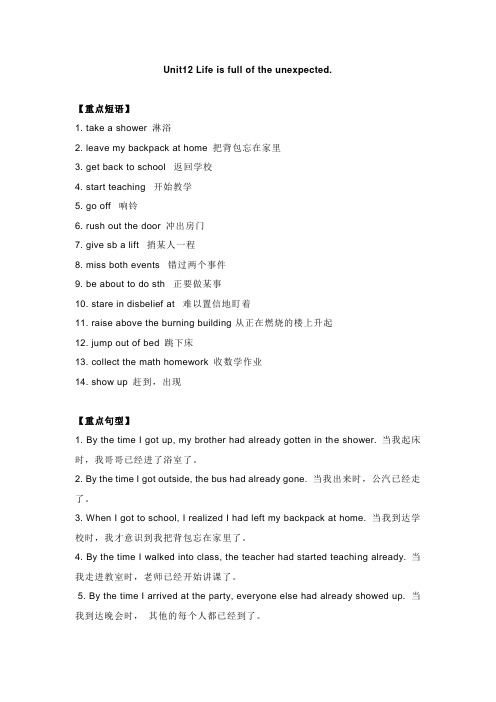
Unit12 Life is full of the unexpected.【重点短语】1. take a shower 淋浴2. leave my backpack at home 把背包忘在家里3. get back to school 返回学校4. start teaching 开始教学5. go off 响铃6. rush out the door 冲出房门7. give sb a lift 捎某人一程8. miss both events 错过两个事件9. be about to do sth 正要做某事10. stare in disbelief at 难以置信地盯着11. raise above the burning building 从正在燃烧的楼上升起12. jump out of bed 跳下床13. collect the math homework 收数学作业14. show up 赶到,出现【重点句型】1. By the time I got up, my brother had already gotten in the shower. 当我起床时,我哥哥已经进了浴室了。
2. By the time I got outside, the bus had already gone. 当我出来时,公汽已经走了。
3. When I got to school, I realized I had left my backpack at home. 当我到达学校时,我才意识到我把背包忘在家里了。
4. By the time I walked into class, the teacher had started teaching already. 当我走进教室时,老师已经开始讲课了。
5. By the time I arrived at the party, everyone else had already showed up. 当我到达晚会时,其他的每个人都已经到了。
人教版九年级英语Unit1-Unit12单元知识点复习资料.
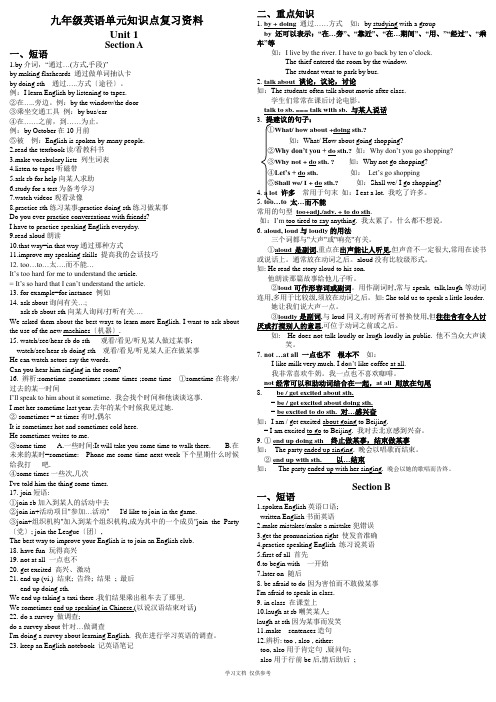
九年级英语单元知识点复习资料Unit 1Section A一、短语1.by介词,“通过…(方式,手段)”by making flashcards 通过做单词抽认卡by doing sth 通过…..方式〔途径〕。
例:I learn English by listening to tapes.②在…..旁边。
例:by the window/the door③乘坐交通工具例:by bus/car④在……之前,到……为止。
例:by October在10月前⑤被例:English is spoken by many people.2.read the textbook读/看教科书3.make vocabulary lists 列生词表4.listen to tapes听磁带5.ask sb for help向某人求助6.study for a test为备考学习7.watch videos观看录像8.practice sth练习某事;practice doing sth练习做某事Do you ever practice conversations with friends?I have to practice speaking English everyday.9.read aloud朗读10.that way=in that way通过那种方式11.improve my speaking skills 提高我的会话技巧12. too…to…太….而不能…It’s too hard for me to understand the a rticle.= It’s so hard that I can’t understand the article.13. for example=for instance 例如14. ask about询问有关…;ask sb about sth向某人询问/打听有关….We asked them about the best ways to learn more English. I want to ask about the use of the new machines〔机器〕.15. watch/see/hear sb do sth 观看/看见/听见某人做过某事;watch/see/hear sb doing sth 观看/看见/听见某人正在做某事He can watch actors say the words.Can you hear him singing in the room?16. 辨析:sometime ;sometimes ;some times ;some time ①sometime在将来/过去的某一时间I’ll speak to him about it sometime. 我会找个时间和他谈谈这事.I met her sometime last year.去年的某个时候我见过她.② sometimes = at times有时,偶尔It is sometimes hot and sometimes cold here.He sometimes writes to me.③some time A.一些时间:It will take you some time to walk there. B.在未来的某时=sometime: Phone me some time next week下个星期什么时候给我打吧.④some times一些次,几次I've told him the thing some times.17. join短语:①join sb加入到某人的活动中去②join in+活动项目"参加…活动" I'd like to join in the game.③join+组织机构"加入到某个组织机构,成为其中的一个成员"join the Party 〔党〕; join the League〔团〕,The best way to improve your English is to join an English club.18. have fun 玩得高兴19. not at all 一点也不20. get excited 高兴、激动21. end up (vi.) 结束; 告终; 结果; 最后end up doing sth.We end up taking a taxi there .我们结果乘出租车去了那里.We sometimes end up speaking in Chinese.(以说汉语结束对话)22. do a survey 做调查;do a survey about针对…做调查I'm doing a survey about learning English. 我在进行学习英语的调查。
九年级英语12单元知识点总结
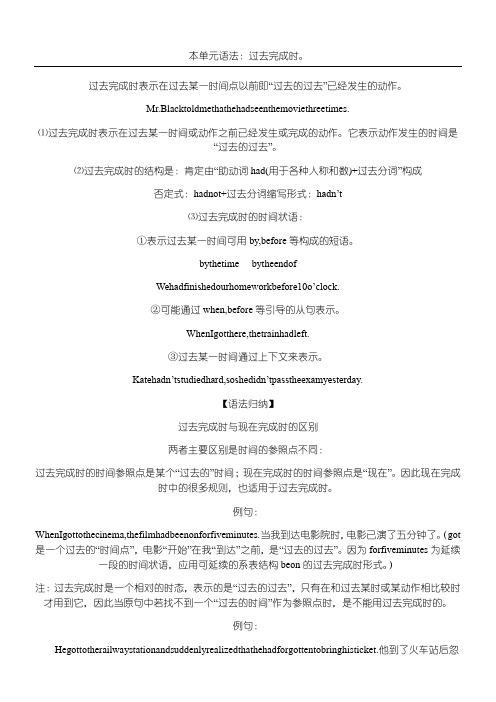
本单元语法:过去完成时。
过去完成时表示在过去某一时间点以前即“过去的过去”已经发生的动作。
Mr.Blacktoldmethathehadseenthemoviethreetimes.⑴过去完成时表示在过去某一时间或动作之前已经发生或完成的动作。
它表示动作发生的时间是“过去的过去”。
⑵过去完成时的结构是:肯定由“助动词had(用于各种人称和数)+过去分词”构成否定式:hadnot+过去分词缩写形式:hadn’t⑶过去完成时的时间状语:①表示过去某一时间可用by,before等构成的短语。
bythetime bytheendofWehadfinishedourhomeworkbefore10o’clock.②可能通过when,before等引导的从句表示。
WhenIgotthere,thetrainhadleft.③过去某一时间通过上下文来表示。
Katehadn’tstudiedhard,soshedidn’tpasstheexamyesterday.【语法归纳】过去完成时与现在完成时的区别两者主要区别是时间的参照点不同:过去完成时的时间参照点是某个“过去的”时间;现在完成时的时间参照点是“现在”。
因此现在完成时中的很多规则,也适用于过去完成时。
例句:WhenIgottothecinema,thefilmhadbeenonforfiveminutes.当我到达电影院时,电影已演了五分钟了。
(got 是一个过去的“时间点”,电影“开始”在我“到达”之前,是“过去的过去”。
因为forfiveminutes为延续一段的时间状语,应用可延续的系表结构beon的过去完成时形式。
)注:过去完成时是一个相对的时态,表示的是“过去的过去”,只有在和过去某时或某动作相比较时才用到它,因此当原句中若找不到一个“过去的时间”作为参照点时,是不能用过去完成时的。
例句:Hegottotherailwaystationandsuddenlyrealizedthathehadforgottentobringhisticket.他到了火车站后忽然意识到他竟忘记带车票了。
人教版新目标九年级英语第十二单元知识点总结
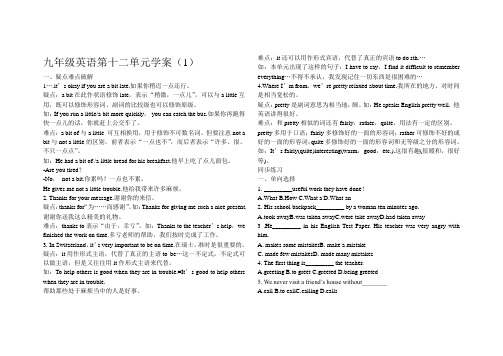
九年级英语第十二单元学案(1)一、疑点难点破解1….it’s okay if you are a bit late.如果你稍迟一点还行。
疑点:a bit在此作状语修饰late,表示“稍微,一点儿”,可以与a little互用,既可以修饰形容词、副词的比较级也可以修饰原级。
如:If you run a little/a bit more quickly,you can catch the bus.如果你再跑得快一点儿的话,你就赶上公交车了。
难点:a bit of与a little 可互相换用,用于修饰不可数名词。
但要注意not a bit与not a little的区别,前者表示“一点也不”,而后者表示“许多、很、不只一点点”。
如:He had a bit of /a little bread for his breakfast.他早上吃了点儿面包。
-Are you tired?-No,not a bit.你累吗?一点也不累。
He gives me not a little trouble.他给我带来许多麻烦。
2. Thanks for your message.谢谢你的来信。
疑点:thanks for“为……而感谢”。
如:Thanks for giving me such a nice present.谢谢你送我这么精美的礼物。
难点:thanks to表示“由于,幸亏”。
如:Thanks to the teacher’s help,we finished the work on time.多亏老师的帮助,我们按时完成了工作。
3. In Switzerland,it’s very important to be on time.在瑞士,准时是很重要的。
疑点:it用作形式主语,代替了真正的主语to be…这一不定式,不定式可以做主语,但是又往往用it作形式主语来代替。
如:To help others is good when they are in trouble.=It’s good to help others when they are in trouble.帮助那些处于麻烦当中的人是好事。
- 1、下载文档前请自行甄别文档内容的完整性,平台不提供额外的编辑、内容补充、找答案等附加服务。
- 2、"仅部分预览"的文档,不可在线预览部分如存在完整性等问题,可反馈申请退款(可完整预览的文档不适用该条件!)。
- 3、如文档侵犯您的权益,请联系客服反馈,我们会尽快为您处理(人工客服工作时间:9:00-18:30)。
Unit12. Life is full of the unexpected课文知识点详解Section A.1.Life is full of the unexpected.【解析 1】 be full of = be filled with 充满,装满①Our life is ______________chances, but there are also a lot of challenges充.(满 )②The box is_______________装(满 ) books.()③On hearing the news, her heart was _____ gratitude.A. filled ofB. full withC. filled withD. fill with【2013 莱芜】 77. If you read a lot, your life will be full ________ pleasure.A. byB. ofC. forD. With X k B 1 . c o m【 2014 辽宁丹东】— Look! Here comes Cindy! She is always full of.— So she is. because she takes a lot of exercise every day.A. knowledgeB. courageC. changeD. energy【解析 2】unexpected adj. 出乎意料的;始料不及的the unexpected“意外的事情”“出乎意料的事”。
the + adj. 表示一类人或事物。
英语中,有些形容词与定冠词the 连用,表示一类人或事物,在句子中起名词的作用。
the homeless (无家可归者 )the disabled(残疾人 )The old should be taken good care of by the government.It will not be unexpected if Tom comes late again, because he is always like this.【2014 甘肃白银】 The girl is greatly interested in the song. The lyrics of it ___ her thoughtsand feelings.A. expressB. discussC. expectD. Imagine2. By the time I got up, my brother ______already ______ in the shower. (1b) X|k | B| 1 .c|O|m3. By the time I got outside, the bus had already left.【解析】by the time 在,,以前,指从过去的某一点到从句所示的时间为止,常引导表示过去的时间状语从句,主句常用过去完成时,即had+ 动词过去分词。
By the time I got up, he had already left.①By the time I ________(walk) into the classroom, the teacher __________(start)________(teach) already.②By the time I got outside , the bus _________already ________(leave).()③____ the time I heard the noise ,it had already gone.A. ByB. WhenC. At() By the time of last term, we ______ all the lessons.A. finishedB. have finishedC. had finishedD. will finish【2013 甘肃兰州】 I overslept this morning. By the time I got to the train station, the train _______ (leave).【2013 山东枣庄】 By the time I locked the door, I realized I ___my keys at home.A. had repairedB. had changedC. had forgottenD. had left【拓展】 by now表示“到现在为止”,通常与现在完成时连用。
By now I have collected 200 dolls.4. When I got to school, I realized I _____ my backpack at home.(1b)【解析】 leave sth. +地点“把某物忘在某处”forget 意为“遗忘某物”,指忘记一件具体的东西,但不能有具体的地点。
I left my book on the desk.I forgot my umbrella yesterday .【辨析】 leave 与 forget 的用法 :(1)leave ―遗留,落下,忘记带‖,侧重指把某物或某人留在某个地方,后常跟地点状语;( 2) forget ―忘记‖,侧重指忘记某件事情,后常跟to do (忘了要去做 )或 doing ( 忘了做过【拓展】 ?leave → left → left v离开)。
(1)leave sth + 地点把某物遗忘在某地(3) leave a message 留言ask for leave (2)leave for + 地点离开去某地请假leave school (中学 ) 毕业(4)leave one by oneself=leave sb alone 把某人单独留下【注意】英语中表示―把某物遗忘在某处‖常用leave + 地点而不是 forget+ 地点Unluckily, I left my book at home【延伸】动词leave 的第三人称单数形式为leaves;而名词leaf的复数也是leaves.【2013 江苏无锡】 I didn ’trealize I __________(leave) the key at home until I got to my car. So I had to go back.【 2013 甘肃兰州】 I overslept this morning. By the time I got to the train station,the train ________ (leave).【 2011 广西贵港】—Lin Kai, hand in your homework, please.—Oh, sorry. I _____it at home this morning.A. was leavingB. has leftC. will leaveD. left http://w ww .xkb1. c om【2013 山东枣庄】 By the time I locked the door, I realized I ___my keys at home.A. had repairedB. had changedC. had forgottenD. had left【 2013 齐齐哈尔】- I ’m sorry, Mr. Li. I_____my English homework at home.-Don’ t forget________ it to school tomorrow.A. left, to bringB. forgot, to takeC. lost, to bringforget→ forgot→ forgotten v 忘记(1) forget sth 忘记某事(不能跟地点状语连用)He forgot his grandfather ’s name.(2)forget to do sth 忘记去做某事(未做)Don’tforget__________(post) the letter for me on your way home.【2014 河北中考】 33. Don’tforget ______ thanks when other people help you.A. acceptB. to acceptC. sayD. to say(3) forget doing sth忘记做过某事(已做)【记】 I never forget to take umbrella with me, but today I lelt my umbrella in that shop.( ) ① –I’m sorry I _____ my homework.— That’s all right. Don ’tforget _____ it to school tomorrow.A. forget; to takeB. left; to takeC. forget; to bringD. left ; to bring( ) ② I _______ to tell him the news that Tom was ill.A. leftB. leaveC. forgetD. forgot【2013 江苏常州】 I believe that an important moment like this should _______ (not forget).【 2013黑龙江齐齐哈尔】 24.- I ’m sorry, Mr. Li. I _____my English homework at home.- Don’ t forget it to school tomorrow.A. left, to bringB. forgot, to takeC. lost, to bring【 2014浙江宁波】 33. — I ’m sorry about last night. It was my fault .—_____A.Forget itB.No wayC.Go headD.My pleasure3— He has to stay in Thailand for one more week because his passport and ID card were stolen.— ___________________.【2014 四川达州】 25. —I ’m sorry I ________ my exercise book at home this morning.A. left; to take — It doesn’ t mater. Don’ t forget ________ it here this afternoon.B. forgot; bringingC. left; to bringD. forgot; to bring5. A: What happened? 发生了什么?(1c)B: I overslept. And by the time I got up, my brother had already gotten in the shower【解析】 oversleep =sleep latev 睡过头 sleep → slept →() ①–What happened ?—I _____.A. oversleepB. oversleepedC. overslept () ② My alarm clock didn ’tgo off, so I____.A. oversleepB. oversleptC. oversleeping ()I ___ this morning and missed the early bus.A. oversleptB. sleptC. held slept oversleep— overslept— oversleptD. caught6.When I got home, I realized I had left my keys in the backpack. (2b)【解析】 leave 在此处做及物动词,“留下”。
